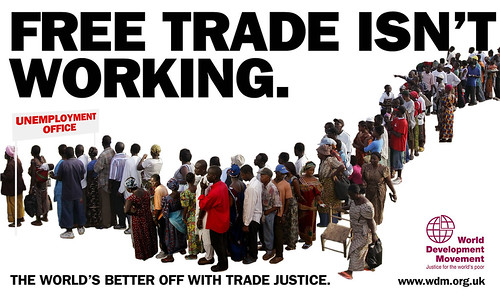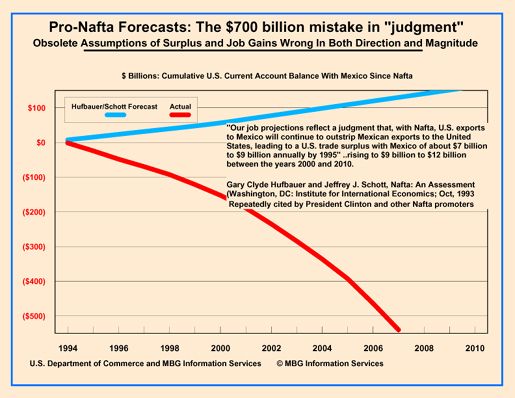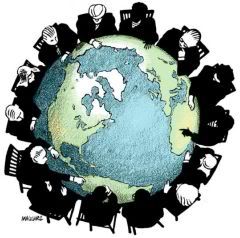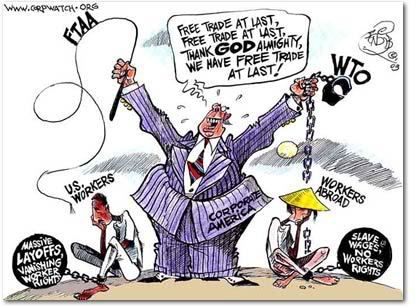(10 am. – promoted by ek hornbeck)
 Has it occurred to you how strange it is that your job can slip across international boundaries, but you are prohibited from crossing the same border to follow that job? It should.
Has it occurred to you how strange it is that your job can slip across international boundaries, but you are prohibited from crossing the same border to follow that job? It should.
Multinational Corporations have been busy for the last twenty years creating a new type of serf. In feudal Europe and Asia, serfs were tied to the land by a master, called the lord, and obligated to work for him. Now, the 1% are creating serfs out of whole nations of people. Sure, those lands are huge-nations-but they are still boundaries that bind you, and prevent you for selling your work freely, while multinational corporations are borderless entities.
Seeking to continue the tail spin to the bottom of wages, big business has been busy writing international treaties, allowing jobs to shift to ever lower paying environments with the least protections for workers. Australia, Brunei, Chile, Malaysia, New Zealand, Peru, Singapore, United States, and Vietnam are already involved in the latest negotiations, the Trans-Pacific Partnership. If signed the treaty will be a “docking agreement” open to any country to sign later. Canada and Mexico are expected to join this month. Japan and China are being courted to join. It is the largest trade agreement the world has ever seen.
The treaty creates an über-government superseding and overriding existing law in sovereign nations–seeking to stamp out democracy. In old feudalism, it was the Catholic church that held dominion over the nations of man. Now “the market” has taken the place of God. Profits are all that matters. Anything the market endorses is right because the market is infallible, unchallengeable. Keep democracy out of it.
The powerful and wealthy have finally found a way to regain the power they once held in feudal times. They have done it in ways intentionally hidden from the majority. Most of us don’t even realize we are in a battle for the type of global governance we will have in the future. For the last 50 years corporate leadership have simply bought our democracies and media outlets, making it easy for corporations to gain the upper hand, and convince voters to support governance that is secretive and totalitarian, without letting voters know they are doing so. Now the 1% want to solidify that power into an actual international treaty. They are seeking one economy under the rule of American corporations. They are, in fact, seeking world dominion.
The Cost of NAFTA
In 1993, the North American Free Trade Agreement (NAFTA) was sold to the American public with grand promises. NAFTA would create tens of
thousands of good jobs here. U.S. farmers would export their way to
wealth. NAFTA would bring Mexico’s standard of living up, providing
new economic opportunities there that would reduce immigration to the
U.S.–Public Citizen
 NAFTA was the opening salvo for the economy of outsourcing. Instead of focusing on reducing tariffs and trade quotas, NAFTA was a new breed of trade agreements. It protected the rights of foreign investors-even over the rights of the people in democratic countries.
NAFTA was the opening salvo for the economy of outsourcing. Instead of focusing on reducing tariffs and trade quotas, NAFTA was a new breed of trade agreements. It protected the rights of foreign investors-even over the rights of the people in democratic countries.
Now, 19 years after NAFTA, most of us can clearly see the benefits touted to the
American worker never materialized. Instead of creating jobs, free trade agreements slashed wages and jobs on both sides of national borders. Investors used NAFTA’s new protections to move US operations to Mexico, where wages were lower and regulations lax. This skyrocketed the US trade deficit and unemployment. Since NAFTA, one in four manufacturing jobs in the US has eroded away, more than a million jobs lost.
Even for the jobs left in the US, the race to the bottom was on. The workers, who still had jobs, felt pressure from the growing number of jobless to accept poorer benefits and, finally, lower wages. NAFTA gutted worker unions, leaving workers without protections from downward pressure on their wages. Decreased income, means decreased tax base, and decreased ability to pay mortgage payments, adding fuel to the housing crisis. This deprived state funded social services, like schools and road repair, eroding local safety nets just when people needed them most. At the same time NAFTA allowed companies to off shored their production, it also allowed those same companies to bring goods and services back into the US duty (tariff) free–thus the “free” in free trade. The end result was increased worker productivity that was rewarded with lower wages, no safety net, and a smaller share of the wealth of the nation, resulting in the redistribution of wealth to the upper 1%. The pro-NAFTA Peterson Institute for International Economics estimated that 39% of the wage inequity that developed during this time was due to trends in international trade. Even with the cheaper goods on Walmart shelves, US workers are worse off with the wage decreases they have suffered.
At the same time NAFTA allowed companies to off shored their production, it also allowed those same companies to bring goods and services back into the US duty (tariff) free–thus the “free” in free trade. The end result was increased worker productivity that was rewarded with lower wages, no safety net, and a smaller share of the wealth of the nation, resulting in the redistribution of wealth to the upper 1%. The pro-NAFTA Peterson Institute for International Economics estimated that 39% of the wage inequity that developed during this time was due to trends in international trade. Even with the cheaper goods on Walmart shelves, US workers are worse off with the wage decreases they have suffered.
Bad for American workers, the agreement was a disaster for Latin Americans. NAFTA duped Mexico, the same way Walmart duped the rest of America. It promised more jobs to Latin American countries if they would give foreign investors a tax break. Local businesses were put at an economic disadvantage by this unequal taxation. Instead of bringing new jobs, foreign corporations merely shifted jobs from local companies to foreign companies. This lead to a large share of profits going off shore, destabilizing Latin American economies. Additionally, NAFTA was used to extract $325 million from member countries in tribunals that overturned already frail environmental laws and labor protections.
Mexican markets were flooded with US taxpayer subsidized corn and wheat products. The subsidized products were priced below what it costs to actually grow these commodities due to the US tax money given to industrial producers of wheat and corn. The price paid for a bushel of corn to a small Mexican farmer, campesino, fell by 50%. Yet the price of tortillas actually increased 279%, leading to food riots in Mexico. The real value of Mexican minimum wage fell by 20%, and the number of families in need of food assistance increased by 50%. Yet, every attempt the Mexican government made to preserve jobs was met with judicial challenges by corporations whose investors are “wronged” by such favoritism of the government. Mexico is now on the verge of becoming a failed state. Migration to the north, due to this social collapse, increased 60% in the years after NAFTA. The massive influx of Latin American workers into the US (undocumented workers up 185%) cycled around to put further downward pressure on US worker wages.
Public Citizen: NAFTA’s Broken Promises
Obama and Free Trade
Leaked drafts of the agreement “sent shock waves through Congress because it showed that U.S. negotiators had totally abandoned Obama’s campaign pledges to replace the old NAFTA trade model and in fact were doubling down and expanding the very Bush-style deal that Obama campaigned against in 2008 to win key swing states.” —Lori Wallach, Public Citizen Global Trade Watch
Obama campaigned against NAFTA and used his stance on NAFTA in his bid for the presidency in 2008, saying it was time to rewrite our trade agreements to something that would create jobs. After his election, he dusted off the free trade deals, Bush could not get through Congress, and became their champion.
Obama also called for congressional passage of three controversial free trade pacts, stating “It’s time to clear the way for a series of trade agreements that would make it easier for American companies to sell their products in Panama, Colombia and South Korea.” —Between the Lines
 All these deals made it past the Republican dominated Congress. Obama even touted this as a success in the recent debates. Despite his assertion that the deals bolstered US exports, the governments own figures show a widening of the trade deficit by 29% over 2011 levels, dragging down jobs with it. Estimates are that 50,000 jobs were lost in the first few
All these deals made it past the Republican dominated Congress. Obama even touted this as a success in the recent debates. Despite his assertion that the deals bolstered US exports, the governments own figures show a widening of the trade deficit by 29% over 2011 levels, dragging down jobs with it. Estimates are that 50,000 jobs were lost in the first few
months of the trade deals. The promised controls over laws in South America have not materialized either-Panama is still a tax haven and Columbia is still the most dangerous place in the world to be a labor leader.
AFL-CIO President, Richard Trumka, has warned that a free trade agreement with South Korea will cost U.S. workers 159,000 jobs, while a deal with Colombia will cost 54,000 jobs. — Between the Lines
After the election, Obama called for a stop to Trans-Pacific Partnership (TPP) negotiations for a “period of reflection.” That reflection never came. The negotiations continued, and Obama’s stance shifted, possibly due to worsening recession-with the thought that the trade agreement would increase jobs. This is nonsense, of course, but many of his advisers supported NAFTA in the Clinton era.
CWA Chief of Staff Ron Collins said, “The TPP is shaping up to become one of the biggest and most destructive trade agreements because it could lead to even more offshoring of our manufacturing and service sector jobs, downward pressure on wages and benefits, and the subversion of our labor rights and environmental protections. But the public is unaware that the TPP even exists because negotiators are keeping their proposals hidden. Americans deserve the right to know what’s being proposed in our names.” —Communications Workers of America

At the time that NAFTA was being negotiated, the full text of the agreement was available on line. This led to a firestorm of controversy-not that the demonstrations against NAFTA had any effect. The agreement was still passed by the Clinton administration.
With NAFTA, jobs went to lower paid Mexico. Other free trade agreements saw jobs flee from Mexico to China. Now, big business feels Chinese workers are being paid too much and have too many protections! They want to move jobs to Vietnam and Malaysia. Labor unions and opposition political parities are illegal in Vietnam
making it the new bottom for low paid, exploited workers.
ACLU has called TPP one of the biggest threats to free speech that nobody knows about. Almost every environmental group and most worker unions have come out against the agreement. Even the Tea Pary is largely against both NAFTA and TPP. Unfortunately, Tea Party candidates usually vote for free trade once in
Congress.
Globalization leaders apparently learned a lesson from their ordeal with NAFTA. While Obama’s trade negotiator, Ron Kirk, called the TPP negotiations “the most engaged and transparent process [possible].”–Public Citizen the truth is self evident. TPP is being negotiated behind closed doors since 2008. (That’s right in the middle of the financial crisis that NAFTA helped to create, the Bush administration opened up another chapter of globalization in secret. Color me surprised.)
None of the text of this agreement is available for the press, Congress, or the peoples of the world who will labor under the treaty. When Sen Ron Wyden, on both the Budget and Finance Committees, requested to read the agreement, he was told
it would not be available in the Congressional reading room, where secret
documents are kept, but he would have to go to the negotiations without staff, paper or pen, in order to read the text.
The secrecy surrounding the negotiations is breathtaking. In July, 134 members of the House of Representatives sent a letter to U.S. Trade Representative Ron Kirk requesting that the appropriate congressional committees be consulted and that a draft of the text be released. The members reminded Kirk that draft texts were circulated and congressional committees consulted throughout the NAFTA negotiations in the early 1990s. Their letter received no response. A month later, House members petitioned Kirk to allow a congressional delegation to observe the negotiations-as in the Uruguay Round of the General Agreement on Tariffs and Trade, the launch of the Doha Round of the World Trade Organization, and numerous NAFTA rounds. Despite its persistence, Congress has not been granted any significant oversight or insight regarding the
negotiations.–Foreign Policy in Focus
A quarter million signatures on petitions were turned in to the US trade representative asking for the text to be released. The only response from the negotiators was to accelerate the timetable for the process so the deal can be signed before public outcry can be obtained.
The schedule for negotiation has recently accelerated in order to bring the agreement to a close. The process has become more and more closed-stakeholder forums, which were more common toward the beginning of the process, have now been replaced with “stakeholder tables” – a table staffed by interested stakeholders to which negotiators may or may not go. The negotiators are also holding off-the-record “intersessional” meetings between official sessions. Public Knowledge
 Currently the text is not to be release to Congress or the public until the negotiations are complete. Congress will be asked to ratify it after a brief time for the public to comment on the deal. Of course, the public will need to comment on it after a near complete media blackout. Proposals that lead up to the final agreement would not be available until four years after it is signed.
Currently the text is not to be release to Congress or the public until the negotiations are complete. Congress will be asked to ratify it after a brief time for the public to comment on the deal. Of course, the public will need to comment on it after a near complete media blackout. Proposals that lead up to the final agreement would not be available until four years after it is signed.
Yet, 600 corporate “advisers” from companies like Wal-Mart, Cargill, Halliburton, Dow Chemical, and led by General Electric, the US corporation that prides itself in pioneering outsourcing, have direct access to the US trade negotiator. It is actually US law that the US trade rep consult with corporate leaders before, during, and after the writing of a trade agreement. The corporate leadership gets to red line any part of this agreement before Congress and the rest of us get a chance to even see it.
Springing a Leak
All the concerns about NAFTA and jobs and trade deficits are amplified in the TPP. Asia, unlike South America, is a hub of technology. Green jobs and high tech
jobs promised in the presidential campaign will go overseas to Asia under this
agreement.
Luckily, the secrecy has been rather leaky. Three sections of the draft have been leaked to the public so far. What has emerged is NAFTA on steroids, with even more
draconian provisions by corporations to overturn democracy and national sovereignty. Only 3 of the 26 chapters of the agreement deal with trade. The other 23 chapters are a dream sheet of corporate hegemony.
1. A Gift for Big Pharma:
The agreement increases the number of years a pharmaceutical company has a monopoly over a drug, beyond the twenty years that already applies in the US. It would broaden the scope of patents, making even minor variations of an old medication patentable, while making it harder to challenge a patent. Finally, it would demand that patents be allowed on plants, animals and surgical procedures.
Developing nations would be prevented from using generics before drug monopolies ended. TPP would negatively impact the number of patients getting compassionate AIDS, Tuberculosis, and Malaria therapy. The first round of generic treatments for patients with HIV in poor nations brought the price per patient from $10,000 to $120.
Just because Britain was such a smarty-pants about your public health care system at the Olympics, the US trade negotiator is pushing several clauses to prevent governments from using formularies to reduce prices for medications, considered a form of price fixing here in the Pharma-friendly US. Of course, most other countries use formularies to keep prices low. TPP would force countries to have a judicial appeal system for pharmaceuticals to make sure governments “appropriately recognize the value” of various drugs. In Australia, where such a system has been implemented, the result was predictably higher drug costs.
—Public Citizen, Citizen Trade
“The leaked text confirms the worst fears of health officials.
The Obama White House is walking back the core concessions on patent
extensions, patent linkage and test data protection that were
negotiated with the Bush White House in May 2007. Obama is now
objectively much worse than Bush on these issues. It may help
the White House raise campaign money from big drug companies, or help
USTR officials find their next high paying job working as lobbyists
for the drug companies. It is a huge disappointment for us.
The texts cover complex issues, and it is hard to summarize all that
is important. Even as regards to the reference to the WTO Doha
Agreement, the White House tries to sneak in text that makes it
appear as though it is limited to only some diseases or emergencies.
Collectively, the provisions are designed to strengthen IPR
monopolies on drugs, and make it harder to regulate prices. The
consequences of stronger monopolies and higher prices are less access
to medicine.”- James Love, Knowledge Ecology International
Don’t be fooled here. Obama is touting increased access. “Increasing access” means new drugs get to market faster and drug companies have access to more markets. What we need is not access to medications, but affordable medications.
“The leaked draft intellectual property proposals by the United States for the Trans-Pacific Free Trade Agreement have confirmed our fears that the Obama administration is walking away from previous efforts to ensure that developing countries can access affordable medicines, setting a dangerous new standard that will likely be replicated in future trade agreements with developing nations. The administration is touting a so-called ‘access window’ as a mechanism to boost access to medicines. In fact, the administration is confusing access with affordability. The ‘access window’ is all about getting brand-name drugs to market faster, and giving their producers longer monopoly rights that prevent price-lowering competition and keeping medicines out of the hands of the millions of people who need them. Our doctors who work across the developing world rely on affordable generic medicines to trade patients. For example, competition among generic manufacturers is what brought down drug prices for HIV/AIDS by 99 percent, from US$10,000 per person per year to roughly $100 today. Trade agreements of the type being pushed this week in Peru threaten these types of crucial gains in access to life-saving medicines.”- Judit Rius Sanjuan, Medecins Sans Frontieres/Doctors Without Borders
2. Gutting Worker and Environmental Protections at the Global Level:
. . . negotiations thus far have given corporations the right to avoid government review when acquiring land, natural resources, or factories. They have also banned corporate performance requirements, guaranteed compensation
for the loss of “‘expected future profits’ from health, labor, [or] environmental” regulations, and included stunning provisions concerning the right to “move capital without limits.” If these are indeed terms of the TPP, then the agreement would make it nearly impossible for countries to hold corporations accountable for their conduct-and would in fact hold governments liable for any “damage” incurred by corporations due to the institution of regulations.–Foreign Policy in Focus

TPP has a rewrite of NAFTA’s “Investor State Section.” Corporations can sue governments directly for violations of their investor’s rights and for projected loss of profits due to democratically passed laws. They do this, not in an impartial international court, but in a tribunal set up with corporate interests in mind, called an “investor-state dispute settlement mechanism.” If the democratic laws of a nation are found to be in conflict with the trade agreement, the trade agreement wins. Corporations can demand taxpayer money to replace predicted future profits not realized due to a nation’s laws. Multinationals already did this in Guatamla Peru, El Salvador, Ecuador and the US. In the US portions of the Clean Air Act, Endangered Species Act and the Marine Mammals Protection Act have all been rolled back under similar agreements. That is why you don’t see dolphin free tuna any more. In fact over $325 million have been extracted already just from countries involved in NAFTA via such a tribunal.–Counterpoint, Public Citizen, Citizen Trade
So far, Australia stands alone in resisting this part of the TPP agreement. Kudos to
the Kiwis.
The provisions undo laws that force exports to be manufactured into some sort of
commodity, making “rip and ship” economies more likely. Current laws in developing nations prohibit raw materials, like logs, from leaving the country. They force exporters to make raw materials into a commodity, like boards, so they support local manufacturing economies. These laws would be undercut, allowing foreign corporations to come into a country, and take the raw materials for export at an inexpensive price, increasing mining or drilling in less developed nations by the cheapest way possible, without regard for the local people or the environmental destruction. The acquired raw materials are shipped to the Western world at a lower financial cost, but a much higher environmental and social cost. Citizen Trade
3. Capital Controls Overturned
After the banking crisis, some countries did re-regulate banks. Countries which instituted such capital controls could be taken to court by private corporations and could be held liable for damages. Limits on the size and scope of financial institutions (too big to fail laws) would be outlawed, reducing the regulation of hedge funds and insurance companies.–Foreign Policy in Focus, Public Citizen —Citizen Trade
4. Public Safety Sacrificed
Countries would be forced to import food that does not meet their minimal safety requirements. The pact would mandate “scientifically justifiable” safety laws, which would undercut any “precautionary principle” for putting new pesticides and other chemicals into the environment. In other words, you would have to prove that a new or current chemical, food additive, genetically modified food caused cancer or some other harm before it could be restricted or removed from your countries shelves.
Additionally, US subsidized corn, soy, cotton, wheat and rice would be dumped on the poorer countries, driving out their family farms. This works to condense the owners of the global food supply into fewer and fewer hands. (Anyone read The Wind Up Girl?) —Public Citizen, CitizenTrade
5. Copyright Use
The draft strengthens copyright to the point of the ridiculous. “Fair use” laws that allow limited copies at libraries and for educational purposes (including the
block quotes commonly seen on blogs) could be abandoned.–Public Knowledge
6. Public Procurement Provisions:
The agreement provides companies greater access to government contracts. This would prevent local governments from favoring local businesses to keep taxpayer dollars in the local economy. It also prevents local governments from spending money preferentially on businesses that do not pollute their environment, advance social goals, or have good human rights records.–Citizen Trade
These represent roll backs of legislation won during the Bush era, making Obama actually worse than Bush on these issues. TPP is being called a trade agreement, but most of the agreement is granting business new privileges over nations and democracies. Collectively this agreement represents big businesses interest in domination of world governments and the end of democracy.
Citizen Trade
Citzens Trade Campaign
Transnational Capitalist Class (i.e. the 0.0001%)
Between the Lines Audio with Ben Beachy
Counterpoint audio with Arthur Stamoulis
Eyes on Trade
What Corporations are Seeking from the Deal
Sign the Petition to tell Obama you want to see the text of the agreement
Donate to reward offered by Wikileaks for leaks of the Agreements drafts

1 comments
Author
We are a collective of anticapitalist authors. Some of us are better than others at answering comments here, but you can always catch us on Facebook or join our Facebook Group. I do check back, so if you comment here, I will see it and answer.
You can also follow us on Twitter.
If you are on Facebook please be sure to…
join our group so we can update you.